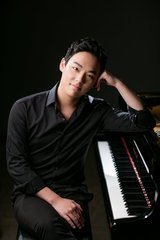|
Back
Flights into the Unknown New York
Zankel Concert Hall, Carnegie Hall
10/29/2021 -
Robert Schumann: Fantasiestücke, op. 12
Fryderyk Chopin: Barcarole in F-sharp Major, op. 60 – Andante spianato and & Grande Polonaise brillante, op. 22
Sergei Rachmaninoff: Daisies, op. 38, No. 3 – Lilacs, op. 21, No. 5 – Sonata No. 2 in B-flat minor, op. 36
Changyong Shin (Pianist) 
C. Shin (© Courtesy of the Artist)
“I feel like a ghost in a world grown alien. I cannot cast out the old way of writing, and I cannot acquire the new. I have made intense efforts to feel the musical manner of today, but it will not come to me.”
Sergei Rachmaninoff (1873-1943)
I’ve never gone to the Indianapolis Grand Prix, but did get an inkling of its speed-for-the-sake-of-speed velocity last night. The occasion was the Gold Medal finalist of the prestigious 2018 Gina Bachauer competition, Changyong Shin, and he is an absolutely fearless firebrand.
His composers were three of history’s greatest technicians (Schumann was apparently a pretty good until his hands were destroyed by a charlatan machine), and Mr. Shin proved that their own prowess could be transferred to a young Korean-born American educated dynamo.
Still, it became, for this listener, a question whether speed and utter dexterity was sufficient for all-embracing satisfaction. When the young Daniil Trivanov whips through the Liszt Transcendental Etudes, he will sacrifice velocity for phrasing. When Horowitz played the Rachmaninoff Second Sonata, that second movement (marked with a puzzling Non allegro) he allowed the flexible phrasing to allow for the theme of the first movement–and the bells–to resonate through. Mr. Shin seemed to transform this so-beautiful section into a mere interlude for the speeds of the runway.
Mind you, Mr. Shin’s gave proof of his huge legerdemainic talent. To begin with the mesmerizing Schumann Fantasy Tales took audacity as well as genius. And in the warmer movements–“Evening” and “Why?” and the final song, he could pull back.
Yet, unlike Chopin, the well-read music journalist Robert Schumann gave us literal pictures, even in his most fiery works. Mr. Shin seemed to ignore that. Oh, what dazzling fingers he gave us in “Dream-Confusions” (my inadequate translation of “Traumeswirren”), and one felt that discombobulation of the composer. Yet in the middle section, we have a startling contrast, and Mr. Shin never achieved that. What was slow and meditative became an entr’acte to a pair of crazy reveries.
In “Whims”, Schumann–and Shin–gave us a technical wonderland. The composer, though, offered surprises, off-rhythms, unexpected modulations, and fantastic rhythms. Mr. Shin’s playing was so blazing that one never heard Robert Schumann’s pictures or poetry. One heard Changyong Shin’s genius. As to “Pride” (“Aufschwung”), this was the composer’s “Excelsior!” moment. Only a young German, like Schumann (or Richard Strauss) could put into music such pride, muscularity, confidence. All of that went into the pianist’s fingers. It was hard to hear the feelings behind it.
The following two Chopin pieces showed Mr. Shin at his best. Chopin rarely drew pictures, and his Barcarole and Grande Polonaise quickly departed from a boatman’s song and a Polish dance to a pair of showpieces. The pianist didn’t fail.
Rachmaninoff’s Second Piano Sonata is an enigma. True, the movements veer from “Fast and Agitated” to “Very Fast”, with that “Not fast” in between. Yet nowhere could Rachmaninoff resist showing off how much he could do with his huge digital composs.
After some lovely playing of two Rachmaninoff bagatelles, Mr. Shin launched into the storm of the Sonata. He did make room for the elegiac second theme, and that was enough to give it more shape. The second movement was played with suitable feeling, but Mr. Shin felt far more at home with the plethora of themes in the “very” fast finale.
For an encore, he went back to Schumann, this the “Träumerei , if to show that he could handle effortless simplicity. It was too late for that, but hardly too late to realize that his divine physicality may happily pursue he essence as well as the excitement.
Harry Rolnick
|